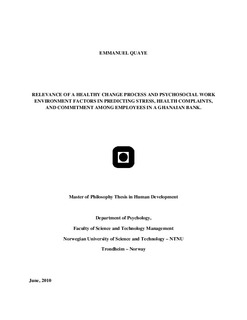| dc.contributor.advisor | Tvedt, Sturle Danielsen | nb_NO |
| dc.contributor.author | Quaye, Emmanuel | nb_NO |
| dc.date.accessioned | 2014-12-19T14:41:44Z | |
| dc.date.available | 2014-12-19T14:41:44Z | |
| dc.date.created | 2011-01-26 | nb_NO |
| dc.date.issued | 2010 | nb_NO |
| dc.identifier | 392075 | nb_NO |
| dc.identifier.uri | http://hdl.handle.net/11250/270527 | |
| dc.description.abstract | This thesis was intended to examine the effect of the healthiness of change process and psychosocial work environment factors in predicting job stress, health complaints and commitment among employees in a Ghanaian bank (N=132), undergoing organizational change. The change process was measured in terms of dimensions from the Healthy Change Process Index (HCPI) and the psychosocial work environment was measured by the Demands-Control-Support (DCS) model. Hierarchical regression analyses revealed that each of the three HCPI dimensions predicted a specific outcome variable. Specifically, early role clarification predicted health complaints; constructive conflicts predicted stress, whereas manager availability predicted commitment. In terms of the DCS factors, demand was salient in predicting both stress, and health complaints, but not commitment. Control and support predicted health complaints, but not stress. Support predicted commitment, and also mediated the effect of manager availability on commitment. Notably, each of the three HCPI dimensions proved relevant in the Ghanaian banking sector but corporate decision makers, change leaders, and HR practitioners ought to concentrate effort on particular HCPI dimensions if they wish to influence stress, health complaints and commitment during workplace changes. Furthermore, the psychosocial work environment ought to be regularly monitored to ensure that these bankers work under reasonable levels of demands, have high control and receive more support if their psychosocial health during change is to be enhanced. In sum, the HCPI and the DCS models proved useful in this case from the Ghanaian banking sector. However, more research within a similar occupational setting will be essential in order to further validate the relevance of these models. | nb_NO |
| dc.language | eng | nb_NO |
| dc.publisher | Norges teknisk-naturvitenskapelige universitet, Fakultet for samfunnsvitenskap og teknologiledelse, Psykologisk institutt | nb_NO |
| dc.subject | Social and Behavioural Science, Law | en_GB |
| dc.title | Relevance of a Healthy Change Process and Psychosocial Work Environment Factors in Predicting Stress, Health Complaints, and Commitment Among Employees in a Ghanaian Bank | nb_NO |
| dc.type | Master thesis | nb_NO |
| dc.source.pagenumber | 80 | nb_NO |
| dc.contributor.department | Norges teknisk-naturvitenskapelige universitet, Fakultet for samfunnsvitenskap og teknologiledelse, Psykologisk institutt | nb_NO |
